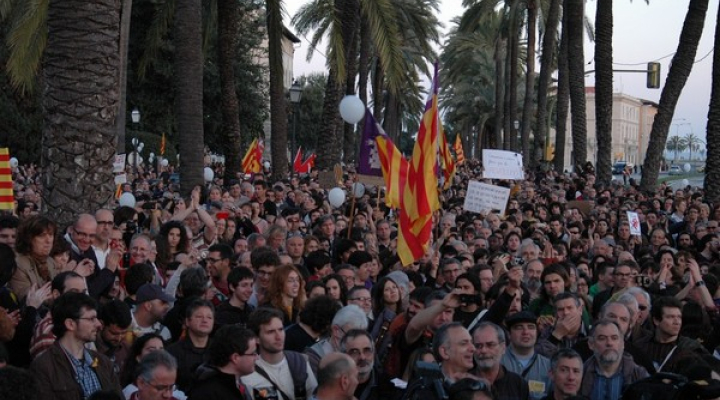Several thousands protested for the use of Catalan language
At the initiative of Csaba Sógor, several MEPs addressed a question to the Commission and the Council.
Several Catalan right promotion groups and cultural organizations asked for the help of DAHR’s MEP Csaba Sógor so that the modification to law 3/2007 of the Balearic Autonomous Community and its dire consequences receive European level attention.
The Hungarian MEP from Transylvania attended the EPP Bureau Meeting in Mallorca at the beginning of March. There he met the representative of the Obra Cultural Balear Association, who - in the name of other Catalan cultural and linguistic rights organizations - asked him – as a member of a traditional national European minority and a defender of minority traditions and rights – to bring to attention in Brussels the changes adopted on the 16th of March in the Balearic Isles.
Ever since the fall of the Franco dictatorship in Spain, in the spirit of democracy and based on multi-party agreements, a well-developed language system was in place in the Balearic Isles. Thus, speaking both Spanish and Catalan was a requirement for all public servants, documents were written in Catalan and it was possible to interact in Catalan. This fact ensured the efficiency of public administration, the proper selection of public servants and the linguistic equality of citizens in front of the law and of the public institutions. The last local election was won by the local member of the EPP, who - contrary to his electoral promise - modified the language law, which was in force since 1986. According to the modification, speaking Catalan in the administration will not be considered mandatory, but merely a professional plus.
As a measure of protest, renowned Catalan language teacher Jaume Boumet has been on hunger strike since March the 1st. He is supported by all local cultural associations, the members of which, along with the entire population of the isles, are worried about the events: Jaume Boumet lost 20 kilograms, he has heart disorders, and the number of his visitors had to be restricted. Even so, the leadership of the local authorities continues to refuse to discuss the issue. The leaders of the associations supporting Boumet announced that they would also go on hunger strike if the problem was not solved after the peaceful protest from the 25th of March.
As expected, several thousands took to the streets on Sunday in order to support the reintroduction of Catalan as a mandatory language. Organizers declared that there were 5000 protesters, while police only counted 2000.
At the initiative of Csaba Sógor, 21 MEPs from different political groups signed an inquiry addressed to the European Commission and the Council of the European Union. In this they asked what the Commission, as the guardian of the Treaties, intends to do in order to cease the linguistic discrimination put into force by the government of the Balearic Isles, considering that the EU protects linguistic diversity. The MEPs also inquired about the intentions of the Commission and the Council concerning the protection of the national minority in the region, regardless of the fact that it forms a local majority.
The Hungarian MEP from Transylvania attended the EPP Bureau Meeting in Mallorca at the beginning of March. There he met the representative of the Obra Cultural Balear Association, who - in the name of other Catalan cultural and linguistic rights organizations - asked him – as a member of a traditional national European minority and a defender of minority traditions and rights – to bring to attention in Brussels the changes adopted on the 16th of March in the Balearic Isles.
Ever since the fall of the Franco dictatorship in Spain, in the spirit of democracy and based on multi-party agreements, a well-developed language system was in place in the Balearic Isles. Thus, speaking both Spanish and Catalan was a requirement for all public servants, documents were written in Catalan and it was possible to interact in Catalan. This fact ensured the efficiency of public administration, the proper selection of public servants and the linguistic equality of citizens in front of the law and of the public institutions. The last local election was won by the local member of the EPP, who - contrary to his electoral promise - modified the language law, which was in force since 1986. According to the modification, speaking Catalan in the administration will not be considered mandatory, but merely a professional plus.
As a measure of protest, renowned Catalan language teacher Jaume Boumet has been on hunger strike since March the 1st. He is supported by all local cultural associations, the members of which, along with the entire population of the isles, are worried about the events: Jaume Boumet lost 20 kilograms, he has heart disorders, and the number of his visitors had to be restricted. Even so, the leadership of the local authorities continues to refuse to discuss the issue. The leaders of the associations supporting Boumet announced that they would also go on hunger strike if the problem was not solved after the peaceful protest from the 25th of March.
As expected, several thousands took to the streets on Sunday in order to support the reintroduction of Catalan as a mandatory language. Organizers declared that there were 5000 protesters, while police only counted 2000.
At the initiative of Csaba Sógor, 21 MEPs from different political groups signed an inquiry addressed to the European Commission and the Council of the European Union. In this they asked what the Commission, as the guardian of the Treaties, intends to do in order to cease the linguistic discrimination put into force by the government of the Balearic Isles, considering that the EU protects linguistic diversity. The MEPs also inquired about the intentions of the Commission and the Council concerning the protection of the national minority in the region, regardless of the fact that it forms a local majority.











